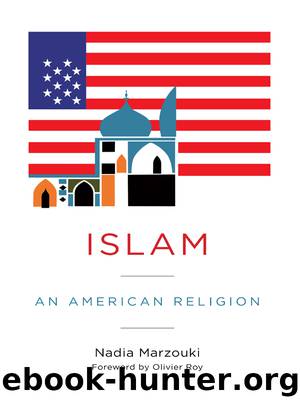Islam by Nadia Marzouki

Author:Nadia Marzouki
Language: eng
Format: epub
Tags: POL007000, Political Science/Political Ideologies/Democracy, REL037000, Religion/Islam/General
Publisher: Columbia University Press
Published: 2017-04-04T04:00:00+00:00
Based on this testimony, the Court finds that plaintiff has shown “Sharia law” lacks a legal character, and, thus, plaintiff’s religious traditions and faith are the only non-legal content subject to the judicial exclusion set forth in the amendment. As a result, the Court finds plaintiff has made a strong showing that the amendment conveys a message of disapproval of plaintiff’s faith and, consequently, has the effect of inhibiting plaintiff’s religion.59
By upholding this opposition between religion as faith and political religion, the discourse of intellectuals and liberal lawyers of all religious backgrounds reinforces a certain “teleological” conception of democracy and of the relation between religions in America. According to this narrative, all minorities were first the object of suspicion and attacks, but by progressively adapting to American culture, they were finally able to put these suspicions to rest.
Paradoxically, the anti-Sharia movement has also led to some good things for Muslims. If the strategy of seizing every occasion to blacken Islam and Muslims in the hope of gaining something by it brought the anti-Sharia movement a lot of publicity, it also seriously compromised what little credibility its leaders had. The anti-Sharia movement also contributed significantly to placing the defense of Muslim rights nearer the top of the agenda of many organizations, liberal or not. Given the extreme character of militant anti-Muslim criticisms, their adversaries were forced to stake out their position more clearly and engage more forthrightly in the defense of Muslim rights. Left-leaning think tanks such as CAP, important civil rights organizations such as the ACLU and the Southern Poverty Law Center, journalists, and ordinary citizens all took up the Muslim cause. Within the Republican Party, certain influential figures such as Chris Christie and Grover Norquist denounced the excessive and unjust character of the whole anti-Sharia undertaking. Jewish and Christian religious authorities also lent their support to the Muslims.
But what this controversy reveals most of all is the striking contrast between the sphere of political discourse and activism and that of law. One may have witnessed an unfurling of verbal violence toward Islam, but one can also observe an unwavering attachment among American judges to constitutional principles and the legal protection of minorities. The role of the latter is all the more decisive and the court decisions all the more intriguing given that the populist mind-set bent on “originalism” and antiliberalism seems to hold a privileged place in public debates. The word “liberal” seems most often to be an insult, and bringing up the notion of equality is enough to get one labeled a socialist. The American situation is in a sense the opposite of the European controversies over Islam. In the United States, the theological-political mind-set, founded on ideas of will and sacrifice, seems to dominate in the public sphere; yet it does not have a direct influence on the law and the justice system, which are the best allies of Muslim Americans. In contrast, the contract-based norms of liberal political theory in Europe are much more influential in public debates.
Download
This site does not store any files on its server. We only index and link to content provided by other sites. Please contact the content providers to delete copyright contents if any and email us, we'll remove relevant links or contents immediately.
| Anthropology | Archaeology |
| Philosophy | Politics & Government |
| Social Sciences | Sociology |
| Women's Studies |
The Secret History by Donna Tartt(19023)
The Social Justice Warrior Handbook by Lisa De Pasquale(12182)
Thirteen Reasons Why by Jay Asher(8882)
This Is How You Lose Her by Junot Diaz(6869)
Weapons of Math Destruction by Cathy O'Neil(6260)
Zero to One by Peter Thiel(5782)
Beartown by Fredrik Backman(5729)
The Myth of the Strong Leader by Archie Brown(5491)
The Fire Next Time by James Baldwin(5421)
How Democracies Die by Steven Levitsky & Daniel Ziblatt(5209)
Promise Me, Dad by Joe Biden(5139)
Stone's Rules by Roger Stone(5078)
A Higher Loyalty: Truth, Lies, and Leadership by James Comey(4945)
100 Deadly Skills by Clint Emerson(4910)
Rise and Kill First by Ronen Bergman(4772)
Secrecy World by Jake Bernstein(4736)
The David Icke Guide to the Global Conspiracy (and how to end it) by David Icke(4696)
The Farm by Tom Rob Smith(4500)
The Doomsday Machine by Daniel Ellsberg(4480)
